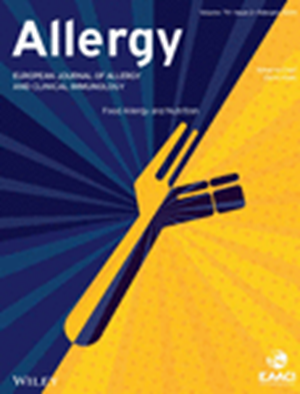Comprehensive αβ T-Cell Receptor Repertoire Analysis Reveals a Unique CD8+ TCR Landscape in DOCK8-Deficient Patients.
IF 12
1区 医学
Q1 ALLERGY
引用次数: 0
Abstract
BACKGROUND Dedicator of cytokinesis protein 8 (DOCK8) is a guanine nucleotide exchange factor highly expressed in, and critical for, the function of various innate and adaptive immune cells. DOCK8 deficiency leads to combined immunodeficiency characterized by susceptibility to infections, autoimmunity, and a severe Th2-type immune response. While dysfunction in various T cell subsets has been implicated in these phenotypes, a comprehensive analysis of the T-cell receptor (TCR) repertoire in these patients has not yet been documented. This study investigates the αβ TCR repertoire in DOCK8-deficient patients to identify features related to disease pathogenesis and explore the potential role of TCR repertoire alterations in disease development. METHODS We compared immune repertoire profiles determined by high-throughput TCR sequencing of circulating CD4+ and CD8+ T cells from patients with DOCK8 deficiency (n = 10) to healthy controls (n = 7) and patients with ataxia-telangiectasia (AT) (n = 5). RESULTS Different diversity analyses revealed a restricted TRA and TRB repertoire in both CD4+ and CD8+ T cells from DOCK8-deficient patients, with the restriction being more pronounced in CD8+ T cells. Skewed usage of individual variable (V) and joining (J) genes and potentially self-reactive CD8+ T cell clones, as determined by hydrophobicity and cysteine indices, were identified in DOCK8-deficient patients. CONCLUSION Our study represents the most comprehensive immune repertoire analysis in DOCK8 deficiency. The identification of a significantly restricted αβ TCR repertoire, along with the detection of potentially autoreactive clones, highlights the crucial role of immune repertoire profiling in elucidating the pathogenesis of DOCK8 deficiency.综合αβ t细胞受体库分析揭示了dock8缺陷患者独特的CD8+ TCR景观
细胞分裂献身蛋白8 (DOCK8)是一种鸟嘌呤核苷酸交换因子,在各种先天和适应性免疫细胞中高度表达,对其功能至关重要。DOCK8缺陷导致以感染易感性、自身免疫和严重的th2型免疫反应为特征的联合免疫缺陷。虽然各种T细胞亚群的功能障碍与这些表型有关,但尚未对这些患者的T细胞受体(TCR)库进行全面分析。本研究旨在研究dock8缺陷患者的αβ TCR库,以确定与疾病发病机制相关的特征,并探讨TCR库改变在疾病发展中的潜在作用。方法通过高通量TCR测序对10例DOCK8缺乏症患者(n = 10)、7例健康对照者(n = 7)和5例失调性毛细血管扩张症患者(n = 5)循环CD4+和CD8+ T细胞进行比较。结果不同的多样性分析显示,来自dock8缺陷患者的CD4+和CD8+ T细胞的TRA和TRB库都受到限制,其中CD8+ T细胞的限制更为明显。通过疏水性和半胱氨酸指数确定,在dock8缺陷患者中发现了个体变量(V)和连接(J)基因的倾斜使用以及潜在的自反应性CD8+ T细胞克隆。结论本研究是对DOCK8缺乏症最全面的免疫库分析。鉴定出明显受限的αβ TCR库,以及检测潜在的自身反应性克隆,突出了免疫库分析在阐明DOCK8缺陷发病机制中的关键作用。
本文章由计算机程序翻译,如有差异,请以英文原文为准。
求助全文
约1分钟内获得全文
求助全文
来源期刊

Allergy
医学-过敏
CiteScore
26.10
自引率
9.70%
发文量
393
审稿时长
2 months
期刊介绍:
Allergy is an international and multidisciplinary journal that aims to advance, impact, and communicate all aspects of the discipline of Allergy/Immunology. It publishes original articles, reviews, position papers, guidelines, editorials, news and commentaries, letters to the editors, and correspondences. The journal accepts articles based on their scientific merit and quality.
Allergy seeks to maintain contact between basic and clinical Allergy/Immunology and encourages contributions from contributors and readers from all countries. In addition to its publication, Allergy also provides abstracting and indexing information. Some of the databases that include Allergy abstracts are Abstracts on Hygiene & Communicable Disease, Academic Search Alumni Edition, AgBiotech News & Information, AGRICOLA Database, Biological Abstracts, PubMed Dietary Supplement Subset, and Global Health, among others.
 求助内容:
求助内容: 应助结果提醒方式:
应助结果提醒方式:


